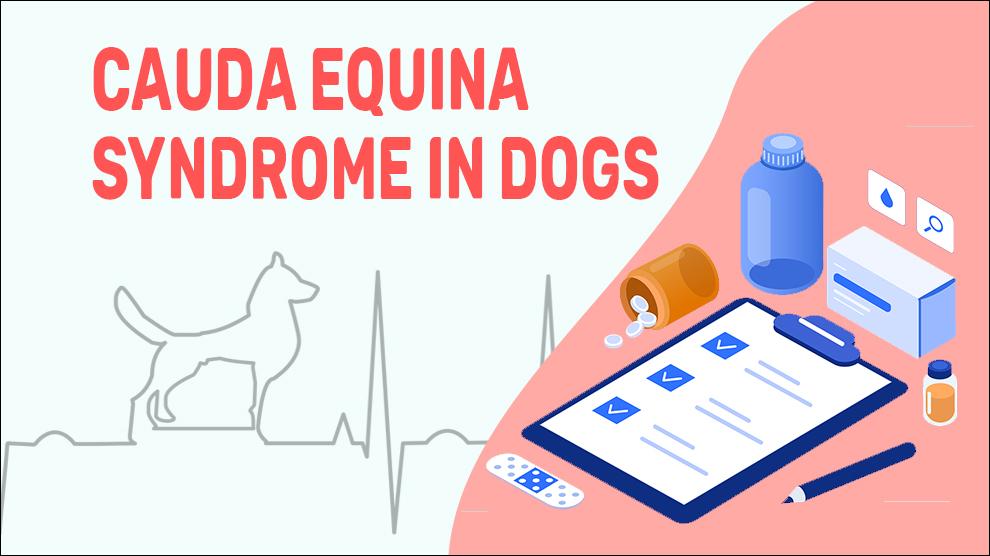What Is Cauda Equina Syndrome In Dogs?
Cauda equina syndrome (CES) is a degenerative, painful, progressive arthritis in the lower back at the lumbosacral junction. Similar to the back pain humans commonly have, the symptoms of spinal problems in dogs are often ignored or dismissed. Pet owners have a tendency to disregard the signs as the dog is just ‘slowing down’ or ‘getting aged’.
Also called a lumbosacral syndrome, cauda in Latin means ‘tail’ and equine means ‘horse - "horse's tail." The bones in the lower section of the spine are called the lumbar vertebrae (lumbo). The triangular-shaped part of the spine that joins the pelvis and lumbar spine is called the sacrum (sacral). Usually, dogs have 7 lumbar (lower back) vertebrae and 3 fused sacral vertebrae.
CES is a condition caused by the compression or destruction of the spinal column nerve rootlets (nerves that extend beyond the spine) by the thinning of the spinal canal.
This really hurts for your dog to wag its tail or walk properly. Moreover, the disc flanked by the vertebra and sacrum is generally deformed causing increased squeezing of the nerves. When the nerves are totally compressed, the dog cannot control its bowel or bladder movements or use its back legs.
Symptoms Of Cauda Equina Syndrome In Dogs
- Unwillingness to walk, reluctant to climb stairs, play or jump.
- Lameness / Abnormal gait
- Shuffling and scuffing toes
- Trailing behind on walks.
- Stiffness or soreness when getting up or down.
- Incontinence / Trouble urinating or defecating.
- Rear paws dragging
Treatment Options For Cauda Equina Syndrome In Dogs
- NSAIDs like:
- Metacam (meloxicam)
- Deramaxx (deracoxib)
- Rimadyl (carprofen)
- Previcox (firocoxib)
- EtoGesic (etodolac)
- If a dog’s CES is severe or does not respond to other forms of treatment. Pain-relieving medications like gabapentin, tramadol, amantadine, etc may be prescribed by veterinarians.
- For reduction of swelling and inflammation in joints, Prednisone, dexamethasone, and other corticosteroids will be prescribed for a short duration.
- Laminectomy - The decompression procedure is performed by the degenerated disc removal and the spinal cord is strengthened by the fusion of bones from other locations in the body.
Home Remedies For Cauda Equina Syndrome In Dogs
- Make sure your dog is still active - Like regular walking and playing with your dog to help their joints work better.
- Weight management for your dog is important. Multiple studies have shown the link between the increased risk of arthritis and being overweight.
- Supplementing for healthy joints - Omega-3 fatty acids, Cannabidiol oil, Glucosamine and chondroitin sulfate.
- Make your dog more comfortable: A hardwood floor may feel less comfortable. You can give them a fluffy bed, carpets on the floor to lie on, and more.
How To Prevent Cauda Equina Syndrome In Dogs?
- Start a Nutritionally Sound Diet Early.
- Exercise Your Dog the Right Way.
- Regular visits to the vet including yearly once comprehensive examination.
- Ask Your Veterinarian about bone and Joint Supplements.
- Maintain your dog’s optimal weight.
Affected Dog Breeds Of Cauda Equina Syndrome
German Shepherd, Great Dane, Beagle, Dachshund, Golden Retriever, Rottweiler, Bernese Mountain Dog, Springer Spaniel, Labrador Retriever
Causes, Types, And Diagnosis For Cauda Equina Syndrome In Dogs
- Causes:
- Certain dog breeds (whose frames carry more weight) like Doberman Pinscher, Shepherds Labrador, Rottweiler, etc.
- Dogs with long spinal cords (Beagle, Dachshund) are more likely to develop CES.
- Types:
- Congenital Cauda Equina Syndrome: Certain breeds are predisposed to CES.
- Acquired Cauda Equina Syndrome: This happens due to any injury, tumor, or infection.
- Mortality:
Mortality due to CES is rare. While CES disease is not life-threatening, it is certainly life-changing. The restricted mobility and the pain in a dog’s daily life are something to be endured.
- Diagnosis:
- Hips and rear legs radiographs.
- Magnetic Resonance Imaging (MRI).
- Arthrograms
- Prognosis:
Check if the breed is predisposed to any genetic issues such as hip dysplasia in dogs. Healthy history is important as if there has been an accident with your dog or ligament injuries may contribute to CES in your dog.
Dogs with mild CES have a good prognosis. With the prompt surgical procedures, most dogs will be free of pain and become ambulatory.
When To See A Vet For Cauda Equina Syndrome In Dogs?
Contact your vet right away, if you notice any of the following:
- Unwillingness to walk, reluctant to climb stairs, play or jump.
- Lameness / Abnormal gait.
Food Suggestions For Cauda Equina Syndrome In Dogs
Whole Foods:
- Vitamin-rich veggies: Cauliflower, Zucchini, Broccoli.
- Antioxidant-packed fruits: Cantaloupe, Blueberries, Cherries, Peeled apple.
- Leafy greens: Kale, Spinach, Collards.
- Fiber-filled veggies: Pumpkin, Sweet potato, Acorn squash.
- Lean protein: Chicken, Turkey.
- Fish: Salmon, Sardines, Mackerel, Tuna.
Oils:
- Omega-3 oils: Green-lipped mussel oil, Fish oil.
- Flaxseed oil (sprinkle over dog’s food).
- Coconut oil (use to sauté dog’s veggies or mix in with dog’s food).
Herbs and Spices:
- Turmeric (powdered or fresh root).
- Parsley
- Fresh ginger root
- Cinnamon
Conclusion
CES in dogs is a progressive disease that affects the animal’s joint health and can restrict a dog’s mobility. Most of the treatments are intended at treating the pain and slow down the progression of CES.
Don’t just share human prescriptions with your pet. Orthopedic medications prescribed for humans can be very dangerous for dogs. This can cause severe and significant side effects when given at the wrong dose.

















